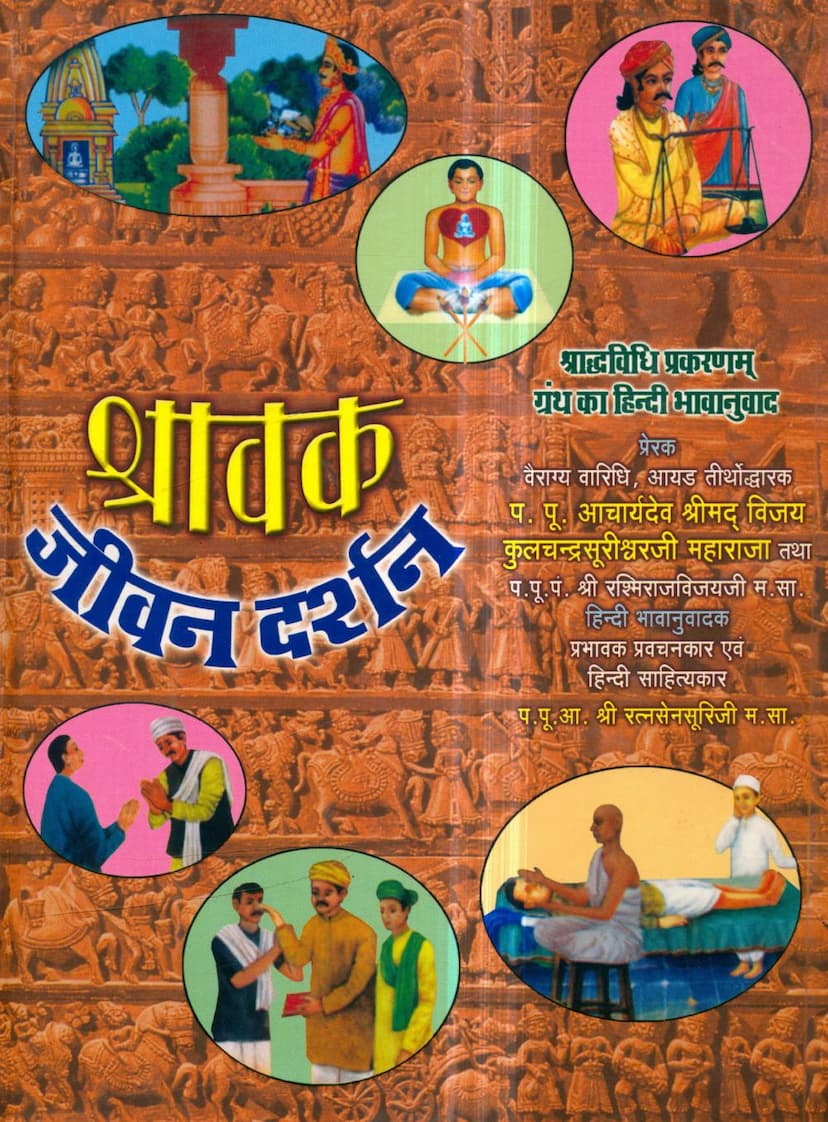Shravak Jivan Darshan
Added to library: September 2, 2025

Summary
This is a comprehensive summary of the Jain text "Shravak Jivan Darshan" authored by Ratnasensuri, published by Mehta Rikhabdas Amichandji. The book provides a detailed guide to the life and conduct of a Jain lay follower (Shravak), offering spiritual insights and practical advice for a virtuous and fulfilling life according to Jain principles.
Core Theme and Purpose:
The central theme of "Shravak Jivan Darshan" is to illuminate the path of a Shravak, a devoted lay follower in Jainism. The book aims to provide a roadmap for living a life that aligns with the teachings of the Tirthankaras, leading to spiritual progress, peace, and ultimately, liberation (Moksha). It emphasizes the importance of integrating spiritual discipline with worldly responsibilities, guiding the Shravak towards a balanced and ethical existence.
Key Concepts and Principles Covered:
The book delves into various aspects of a Shravak's life, encompassing:
- Daily Conduct (Dina-Krutya & Ratri-Krutya): It outlines the prescribed daily routine, starting from waking up, spiritual practices like Samayika (meditation/equanimity), prayers, and scripture study, to engaging in righteous worldly activities. It stresses the importance of mindful living, detachment, and carrying out duties with devotion.
- Ethical Principles and Vows (Vratas): The text elaborates on the core Jain ethical principles and vows (Anuvratas, Gunavratas, and Shikshavratas) that lay followers are expected to observe. It explains the significance of non-violence (Ahimsa), truthfulness (Satya), non-stealing (Aparigraha), celibacy/chastity (Brahmacharya), and non-possession (Aparigraha) in daily life, providing practical guidance on their observance.
- Dietary Regulations (Bhojan Vidhi): A significant portion is dedicated to dietary rules, including the classification of food items (Sanchit, Achit, Mishrit), the importance of eating only pure and spiritually beneficial food, and the proper methods of eating, emphasizing mindfulness and avoiding unnecessary harm.
- Social and Financial Conduct (Vyavahar Shuddhi): The book addresses the ethical conduct expected in social and financial dealings. It highlights the importance of honesty, integrity, fairness, and non-violence in business and professional life, warning against practices that lead to harm or unethical gains.
- Spiritual Practices: It emphasizes the significance of various spiritual practices such as Samayika, Pratikraman (repentance and confession of faults), Upavasa (fasting), Japa (chanting of mantras like Navkar Mantra), and contemplation on philosophical truths.
- Purdha-Purusharthas: The text connects the pursuit of Dharma (righteousness) with Artha (wealth) and Kama (desire), explaining that these worldly pursuits are only meaningful and permissible when they do not obstruct spiritual progress and are aligned with Dharma.
- Stages of Shravakship (Pratimas): It may touch upon the progressive stages or vows that a Shravak can undertake to deepen their spiritual practice and commitment.
- Auspicious Observances (Punya Karma): The book encourages participation in religious festivals, temple visits, congregational prayers, and acts of charity and service (Samayik Vatsalya) as means to accrue merit and enhance spiritual well-being.
- Renunciation and Detachment: While focusing on the lay life, the text also subtly instills the spirit of detachment from worldly possessions and desires, encouraging a gradual progress towards renunciation for those spiritually inclined.
- Role of Gurus and Scriptures: It underscores the importance of seeking guidance from enlightened Gurus and diligently studying Jain scriptures for spiritual knowledge and practical application.
- Moksha Marga (Path to Liberation): Ultimately, all the teachings and practices are presented as steps on the path to Moksha, the ultimate goal of liberation from the cycle of birth and death.
Structure and Content Highlights (based on chapter titles and descriptions):
The book appears to be structured thematically, guiding the reader through various facets of Shravak life. While the provided text doesn't offer a detailed chapter-by-chapter breakdown of the content in English, the chapter titles and interspersed descriptions suggest the following structure:
- Introduction and Manglacharan: Begins with auspicious invocations and blessings.
- The Shravak's Identity and Qualities: Defines what constitutes a true Shravak, emphasizing inner purity and adherence to principles rather than mere outward appearances. It likely details the virtues and qualities expected of a Shravak.
- Daily and Nightly Duties: Detailed schedules and practices for morning and evening routines.
- Observances on Auspicious Days (Punya-Krutya): Guidance on conduct during festivals and special days.
- Seasonal Observances (Chaturmasic Krutya): Specific practices during the monsoon period.
- Annual Observances (Varshik Krutya): Important annual religious activities and commitments.
- Life Cycle Rituals (Janma-Krutya): Guidance on religious observances related to significant life events.
- Detailed guidance on various aspects: The latter parts of the text seem to cover specific topics like temple maintenance, puja rituals, donation practices, financial ethics, social conduct, the importance of scriptural study, dealing with different situations and people, and the final preparations for spiritual liberation.
Overall Tone and Message:
The book's tone is devotional, instructional, and encouraging. It aims to inspire readers to lead a life of purpose, discipline, and devotion, emphasizing the transformative power of adhering to Jain principles. The underlying message is that a Shravak's life, when lived with diligence and sincerity, can be a profound spiritual journey, contributing to personal well-being and the propagation of Jainism. The extensive coverage suggests a very practical and exhaustive approach to Shravak dharma.
In essence, "Shravak Jivan Darshan" serves as a comprehensive manual for Jain lay followers, offering a detailed and inspiring vision of how to live a spiritually enriched and ethically grounded life in accordance with the profound wisdom of Jainism.